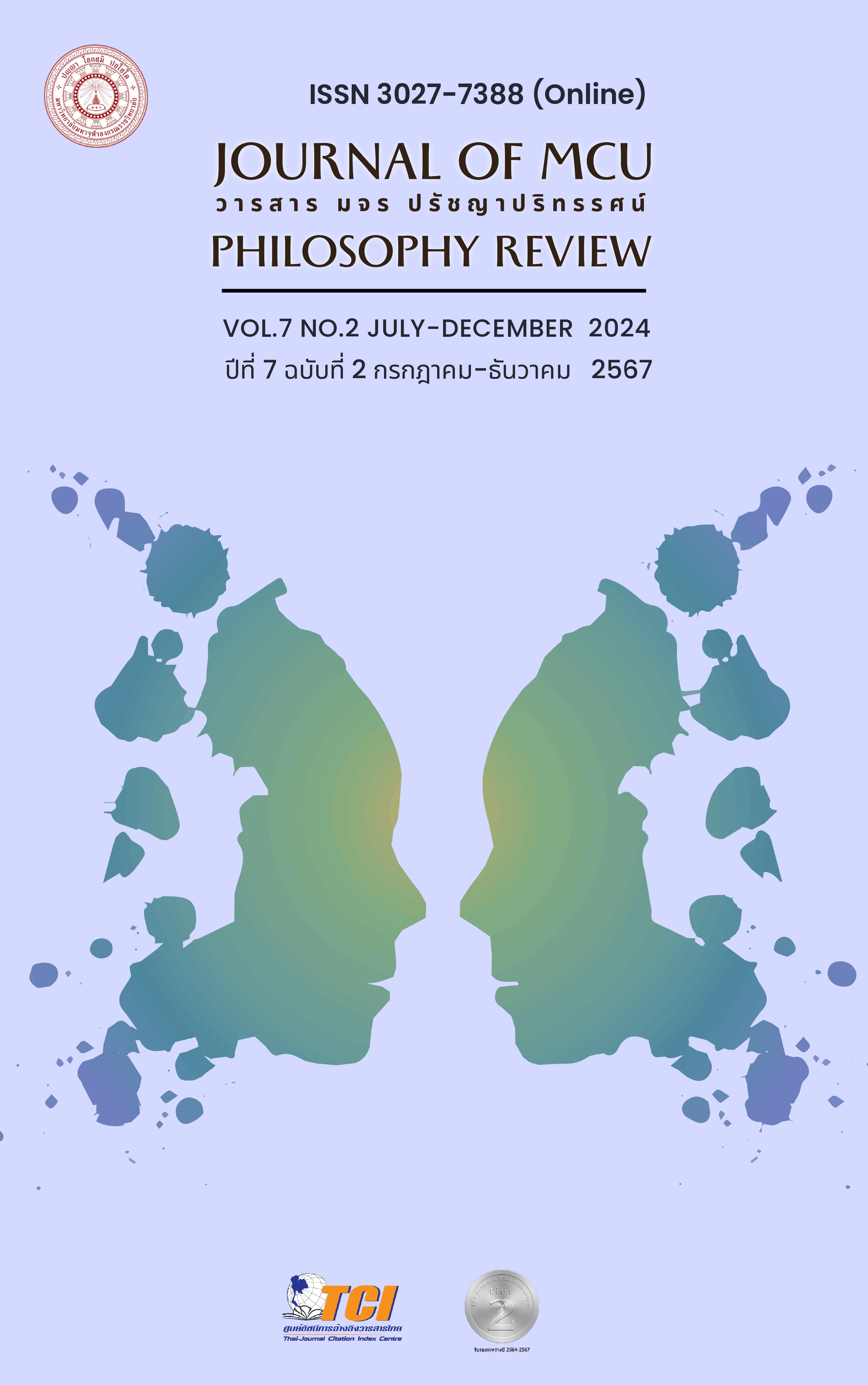THE CONCEPT OF BODHISATTVA AS AN ETHICAL FOUNDATION IN MAHAYANA BUDDHIST PHILOSOPHY
Main Article Content
Abstract
This research article is a study. The concept of the Bodhisattva as an ethical foundation in Mahayana Buddhist philosophy. It has three objectives: 1) to study the concept of the Bodhisattva in Mahayana Buddhist philosophy 2) to study the ethical concepts in Mahayana Buddhist philosophy 3) to analyze the relationship between the concept of the Bodhisattva and the ethical practices of Mahayana Buddhist philosophy. This research employed the qualitative research methodology done by critically studying documents, texts and related research works. From the study it was found that the concept of a bodhisattva in Mahayana Buddhist philosophy It is the main concept of the Bodhisattva practice. According to the principles that Bodhisattvas must practice during the period of determination. To reach Buddhahood with the ethical concepts of Mahayana Buddhist philosophy There is emphasis on the two basic principles of Bodhisattva ideology: compassion and wisdom. Compassion and wisdom were developed to be important in grappling with complex problems. By using intelligence to find solutions to problems that arise and acting consciously. It can be seen that the ideology of the Bodhisattva is an important goal of the ethical concept of Mahayana Buddhist philosophy. Which is a practice that produces moral results. A Bodhisattva is a person who lives according to the ethical principles of Mahayana Buddhist philosophy. According to the concept of the Bodhisattva as the ethical foundation of Mahayana Buddhist philosophy throughout the present.
Article Details

This work is licensed under a Creative Commons Attribution-NonCommercial-NoDerivatives 4.0 International License.
บทความที่ได้รับการตีพิมพ์เป็นลิขสิทธิ์ของวารสาร มจร ปรัชญาปริทรรศน์
ข้อความในบทความที่ได้รับการตีพิมพ์ในวารสาร ถือเป็นความรับผิดชอบของผู้เขียนบทความ และข้อคิดเห็นนั้นไม่ถือว่าเป็นทัศนะและความรับผิดชอบของกองบรรณาธิการวารสาร มจร ปรัชญาปริทรรศน์
References
มหาวิทยาลัยมหาจุฬาลงกรณราชวิทยาลัย. (2539). พระไตรปิฎกฉบับภาษาไทย ฉบับมหาจุฬาลง กรณราชวิทยาลัย. กรุงเทพมหานคร: โรงพิมพ์มหาจุฬาลงกรณราชวิทยาลัย.
ประพจน์ อัศววิรุฬหการ. (2557). โพธิสัตวจรรยา: มรรคาเพื่อมหาชน. พิมพ์ครั้งที่ 2. กรุงเทพฯ: โรงพิมพ์แห่งจุฬาลงกรณ์มหาวิทยาลัย, 2557.
เสถียร โพธินันทะ. (2544). วิมลเกียรตินิทเทศสูตร. พิมพ์ครั้งที่ 8. กรุงเทพฯ: สำนักพิมพ์มหามกุฏราชวิทยาลัย.
เสถียร โพธินันทะ.(2548). ปรัชญามหายาน. พิมพ์ครั้งที่ 5. กรุงเทพฯ : โรงพิมพ์มหามกุฏราชวิทยาลัย.
ประทุม อังกูรโรหิต.(2553). พระมหาปณิธานของพระโพธิสัตว์ ข้อโต้แย้งทางปรัชญาของฌินรัน.กรุงเทพฯ: จุฬาลงกรณ์มหาวิทยาลัย, 2553
เสถียร พันธรังสี.(2549). ศาสนาเปรียบเทียบ. พิมพ์ครั้งที่ 10. กรุงเทพฯ : สำนักพิมพ์สุขภาพใจ.
สุมาลี มหณรงค์ชัย.(2546). พุทธศาสนามหายาน. กรุงเทพมหานคร: สำนักพิมพ์ศยาม.
Har Dayal. (1970). The Bodhisattva Doctrine in Buddhist Sanskrit Literature. Delhi: Sundarlal Jain.
Nagao, G.M. (2000). The Bodhisattava’s compassion Described in the Mahayana-sutralamkara. Honolulu: University of Hawai’I press.
พระมหาสมจินต์ สมฺมาปญฺโญ. (2547). อารยธรรมพระพุทธศาสนาในทิเบต. กรุงเทพมหานคร: สำนักพิมพ์สุขภาพใจ.


